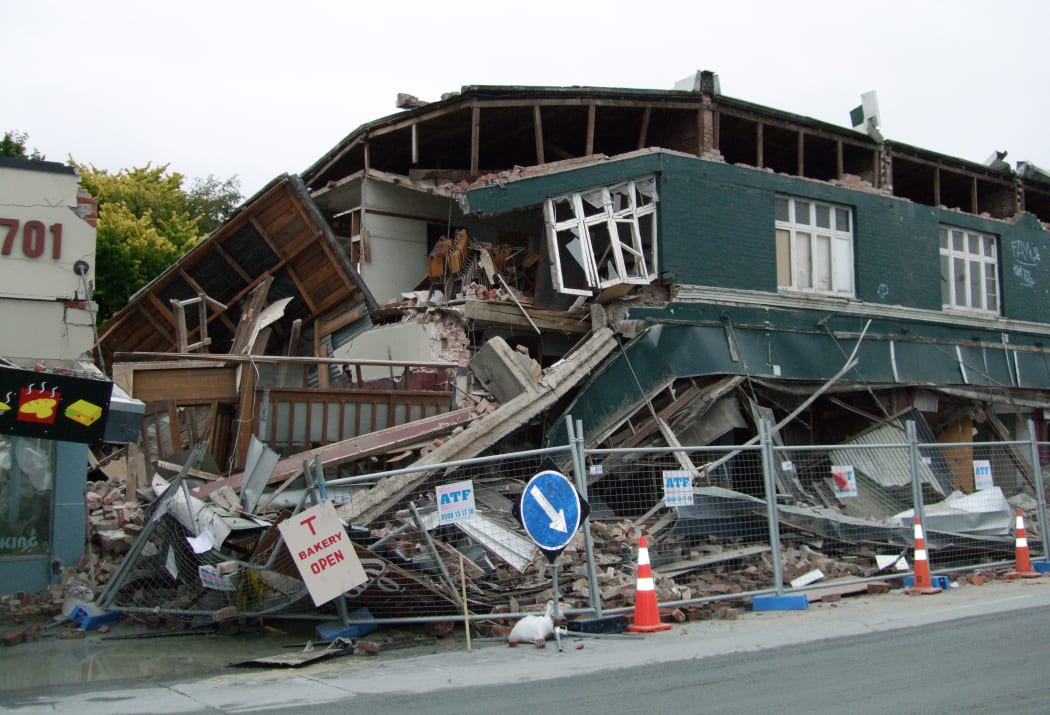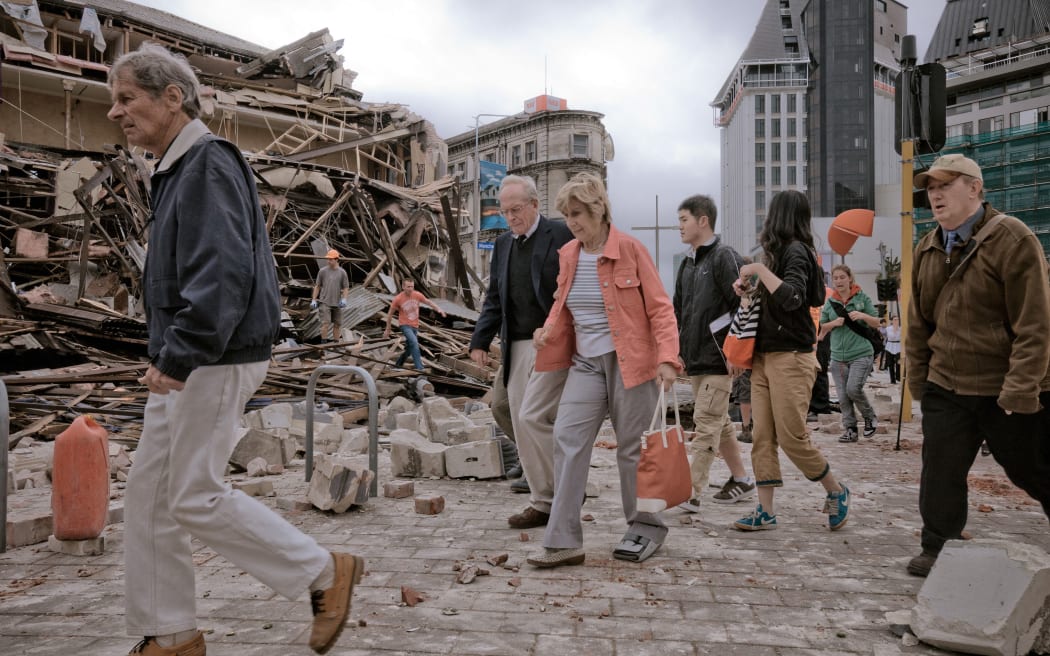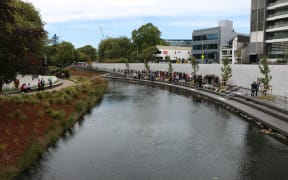The experiences on 22 February 2011 of three Radio New Zealand reporters who were working in Christchurch on the day the earthquake hit.

A photo taken on 22 February 2011 shows a collapsed row of shops on Worcester Street in Christchurch. Photo: AFP
It started out quite summery, the 22nd February 2011. I wore ballet flats, a dress. Had bare legs.
It proved a very poor wardrobe choice.
Aside from the need to wade through fresh pools of murky liquefaction and bits of broken building - the temperature after the quake dropped dramatically. I was freezing. The coldest I can ever remember being. My jaw seized up and my fingers couldn't hold a pen to write on the notebook I'd stolen from the Ecan (regional council) bunker.
Some hours after the quake as I hovered around then Prime Minister John Key trying to get him to speak on the phone to then Checkpoint host, Mary Wilson - his Press Secretary Danielle Coe took one look at me, took the warm coat off her back and put it on mine. It was properly lined. Wool. Absolute heaven. I kept it for weeks.
Read more on the 10th anniversary of the Christchurch quake:
- Follow RNZ's full coverage here
- Then and now: How the 2011 Christchurch earthquakes changed the city
- First-hand accounts of the Christchurch 2011 earthquake: 'I just felt I'm gonna die'
- Today marks a decade since Christchurch's deadly quake
Months after that February day, someone pointed out that the temperature probably hadn't dropped - I was that cold because I'd been in shock.
There was of course a lot to be shocked about. Where to even begin?
When the quake struck I was interviewing a Kiwi-Libyan man in Wellington, a pre-recorded chat over the phone, in the sound booth. Things were really kicking off in his homeland, it was the Arab Spring.
At 12.51, when I was in the middle of a rambling question, it hit. The little room rocked violently - I made it out of my seat, to the door frame. Clung to it as the heavy studio door swung on its hinges, squishing my fingers. In the recording you can hear me swearing in the background, a high pitched terrified voice. Then back on the mic, a polite apology to Baha, before hanging up and saving the recording in the system.
We left the building calmly, but awful quick smart. My bag, phone, keys were underneath a fallen filing cabinet, so I just took my recording gear and a pen. We took the stairs, as you're always told to do, grateful we still had stairs to use. Workers from every floor were exiting their offices, politely merging like zips on the concrete steps. No chat, just a wide-eyed acknowledgement of what had happened.
Outside the air was thick with the dust of collapsed buildings. Alarms were ringing, cars abandoned in their tracks.
In nearby Victoria Square our little newsroom of four hunkered down with dozens of strangers. It seemed a safe spot. But minutes later when the first major aftershock shook, we cowered. People dropped to their knees and whimpered. I remember seeing the high rise buildings on the fringes of the square swaying and thinking they'd fall on us.
We split up to report in pairs.

People walk through debris in the aftermath of the 22 February earthquake in Christchurch. Photo: AFP
Rachel Graham and I had a short spell in the Ecan bunker (where I acquired that notebook) with key members of various emergency services. We asked questions, reported answers. I vividly remember the ashen-faced Fire Service man who answered my question about trapped people with two words, words he could hardly get out: Multiple deaths.
Rachel did the live stuff. I couldn't trust myself to speak to the nation. It would take several hours, and a phone call to mum, before my shaky voice calmed down enough to report live from the scene.
That scene was the infamous Latimer Square, which was like the unofficial EQ HQ. Distraught people came looking for lost loved ones, a triage tent had been set up. Doctors who'd been at a nearby conference put to work. The mother of a young woman came running up to us crying - had we seen her daughter? We hadn't. She was frantic. I've thought about that woman a lot over the years. Did she ever find her daughter?
Alongside the square it was the six stories worth of CTV building - collapsed and burning - that took everyone's attention, and most of the lives lost that day.
Some time that evening the chief reporter sent me home, I'd be needed at 5am the next morning. I told him I didn't know if I had a home to go to, didn't have my bag, keys, phone or a wallet. Just see how you get on, he'd said.
So off to another square, Cranmer this time, to my flat that was still standing, oblivious to the day's events.
I got in and sat by the lounge window, eating a yoghurt, wondering what to do. The streets all around had been evacuated. It was the OG red zone.
A police officer walked along the dimly lit road with a torch shouting repeatedly ... is anyone there?
I waved and replied from behind the curtain. He came in, kindly told me to leave. And even more kindly let me borrow his phone so I could ring my boyfriend in Auckland to get one of his Christchurch-based family to get me.
I'd only been living in the city a month and knew few people to call on.
I packed a bag, and waited at the cordon. Hiding inside a broken down tram for hours. No power, no light. My feet and ankles covered in mud. Feeling lonely and very vulnerable.
I didn't know who was coming or when. But finally, just as I was considering sleeping in the tram, I heard my sister-in-law calling my name from across the street. I have never been so relieved.



